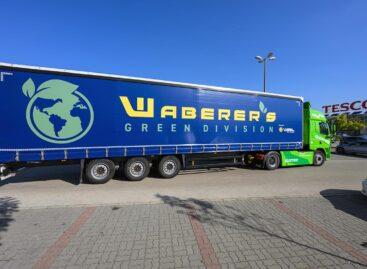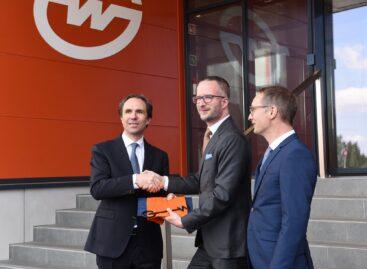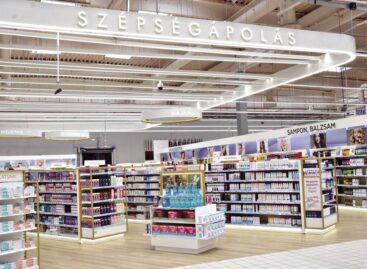Magazine: Automation can solve the workforce shortage problem
The warehousing sector suffers from a lack of workforce. Technological development forces companies to modernise, so automatic and semi-automatic systems are spreading. Pallet-wise a wide range of needs are manifesting, especially those of products being practical, clean and environmental. Thanks to information technology, certain processes are becoming simpler and more transparent.

Márton Palasik
project manager
SSI Schäfer
SSI Schäfer’s profile is planning logistic processes and doing preparations for warehouse investments – technological planning, manufacturing and implementation, plus post-project monitoring. Project manager Márton Palasik told our magazine that customer needs are changing: companies don’t want to store lots of goods in their own warehouse, so the majority of orders is low in number but partners order more often than before. Demand for automation is on the rise, but the majority of companies aren’t aware of investment costs and return times or system requirements.

Tamás Kondor
head of logistics
Galambos Logistic
Galambos Logistic Kft. is a key service provider in Vas County: they do warehousing on 20,000m². Tamás Kondor, logistics manager of the company talked to us about the latest trends: he also senses a shift in the direction of automation. Already existing warehouses make do with semi-automatic systems, because fully automatic system requires a major investment. Newly built warehouses of large logistic companies tend to go for a fully automatic system. At the end of 2016 Galambos Logistic Kft. started using their sixth logistics hall.

Zoltán Horváth
managing director
Jungheinrich Hungária
In the field of intralogistics digitalisation and network building, automation, energy efficiency and safety are playing the main role. Jungheinrich has already put the main directions of intralogistics 4.0 into practice. Zoltán Horváth, managing director of Jungheinrich Hungária Kft. told Trade magazin that their material handling machines are very energy-efficient, in part thanks to the unique ‘2Shifts1Charge’ technology that they are using. Almost every new forklift truck is available with the lithium ion technology. Demand has been growing for Jungheinrich’s automatic solutions for years, e.g. for self-driving forklifts. They also offer many new digital and network solutions, it is enough to mention the remote-controlled easyPILOTfollow order picking forklift, the ‘smart’ high-rack stacker EKX 516 and the WMS warehouse management system.

Róbert Nákity
project manager
DS Smith Packaging
Hungary Papillon
DS Smith specialises in corrugated cardboard packaging solutions, manufacturing primary (boxes, trays, etc.) and secondary (collective boxes, containers, etc.) packaging. Róbert Nákity, PaPillOn project manager of DS Smith Packaging Hungary told us that the company pairs the advantages of corrugated cardboard designs with the new needs emerging in the domain of ‘logistic’ packaging. The company’s packaging strategies gave a new meaning to the concept of pallets: in the DS Smith PaPillOn line there is a 100-percent paper fibre pallet, a container and a top deck. The pallet’s weight is half of a classic wooden pallet’s weight, and at the same time it is clean and environmentally friendly. Its design meets all EUR pallet standards, but its size and shape can also be customised to partner needs.

Ferenc Polgár
managing director
P&P Budafok
According to Ferenc Polgár, managing director of P&P Budafok Kft., there has been no significant change in the pallet market recently, the UIC-EUR – EPAL-EUR debate has been settled: pallets are exchanged without limitation. Demand is increasing for single-use pallets, the typical sizes are 80×120, 100×120, 114×114 and 60×80. The managing director opined that the two biggest problems in pallet production at the moment are rapidly growing raw material prices and the workforce shortage. To the latter problem the solution can be automation. As import to non-EU countries is growing, demand is also rising for the heat treatment of pallets; luckily, P&P Budafok Kft.offers IPPC-certified heat treatment service to partners.
What about the warehouse IT market? There are companies supplying the warehouse modules of enterprise resource planning (ERP) systems, and there are those that provide partners with special logistic software.

Pál Bérces
managing director – owner
QLM Logistics Solutions
Pál Bérces, owner and managing director of QLM Logistics Solutions Kft. revealed: QLM is special among warehouse management system (WMS) software suppliers, due to their expertise in logistics. Partners not only get the software product from QLM but also a plan for optimising their warehouses processes. Mr Bérces mentioned that not only the lack of workforce causes problems in the sector, but also the deterioration in the quality of workers.Warehouse informatics need to keep up with the changes generated by industry 4.0, therefore warehouse IT has to come up with flexible systems that can also be personalised. QLM Logistics Solutions Kft. offers new planning services, their WMS software has new functions and the company has formed specialist teams for designated sectors.

Annamária Ligeti
marketing manager
L-mobile Hungary
According to Annamária Ligeti, marketing manager of L-mobile Hungary Kft., changes are occurring in the quality of in-warehouse services. Two factors are decisive in this area: precision and speed of service. The company’s L-mobile warehouse IT product is a mobile device supported warehouse management solution that suits the needs of both small businesses and multinational companies. Their application-based data registering and displaying software products and can be integrated with many ERPs; a further advantage is that they can easily be made compatible with existing IT systems. L-mobile Hungary Kft.’s Warehouse product speeds up warehouse processes in every way possible. Another one of the company’s new products is Trailer Yard Management: this solution monitors the route of trucks or lorries at the premises and plans the work of loaders in real time. //
Related news
Mol Vagyonkezelő Kft. and Trevelin Holding Zrt. acquired 15 percent of Waberer’s
Mol Vagyonkezelő Kft., owned by Trevelin Holding and Mol, bought…
Read more >NGM: innovation means the future of the food industry, State Secretary Gergely Fábián handed over new developments
In the framework of the Food Supplier Development Program (ÉLIP…
Read more >Gebrüder Weiss Kft.’s HUF 10 billion investment in the future of logistics
Gebrüder Weiss Kft.’s new HUF 10 billion investment was handed…
Read more >Related news
The latest issue of Trade magazin is out now!
The digital version is available with more content once again…
Read more >FAO: global food prices increased for the second month in April on a monthly basis
In April, global food prices rose for the second month…
Read more >Beauty care travels at breakneck speed
Beauty care is one of the fastest growing markets in…
Read more >







